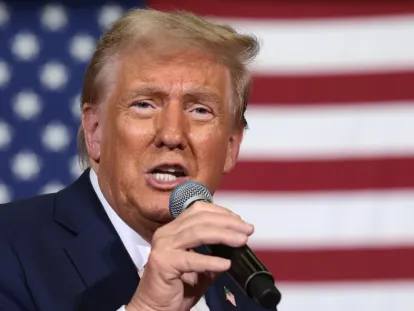After an unexpectedly large victory, analysts examine the likely impact on the region.
President Donald Trump won a larger-than-expected victory on Tuesday, signaling a major shift in U.S. policy including toward Latin America. On the campaign trail, Trump emphasized pledges of an unprecedented immigration crackdown, including mass deportations, and has suggested he may impose tariffs on cross-border trade with Mexico.
Republicans also captured a majority in the Senate, while control of the House of Representatives was not yet decided at press time.
AQ asked analysts to share their reactions on what a second Trump presidency means for Latin America and the world.
Lucía Dammert
Dammert is a professor of international relations at the Universidad de Santiago de Chile
Donald Trump’s victory not only secures him the White House but also hands the Republicans control of the Senate and possibly a majority in the House. They already dominate the Supreme Court. This near-total control presents enormous challenges for the U.S. and the world. Yet the vote is decisive—the American people have chosen him, despite the trials, aggressive behavior, and deep polarization. While it is not yet time to dissect the issues within the Democratic campaign, or the influence of Elon Musk and other key players on the Republican side, these topics undoubtedly merit detailed study.
Trump’s victory redefines the U.S. relationship with several Latin American governments. It will have particular significance for newly elected President Claudia Sheinbaum in Mexico. Border control, migration policy, the war on drugs, nearshoring, and U.S.-China relations will become central themes in the binational agenda. In contrast, the relationship with Brazil, Latin America’s largest economy, appears lower on the priority list, which could accelerate the formation of alternative global alliances. As for Venezuela, it will likely remain a populist talking point with little expectation of actions to strengthen democratic outcomes. For leaders like Milei and Bukele, while Trump’s narrative might resonate, it remains to be seen whether this alignment will translate into specific political actions.
Nevertheless, Trump’s election could present a unique opportunity for Latin America. Confronted by economic challenges, political instability, climate change, and a position between global powers, the region’s leaders should pursue collaborative mechanisms to create a unified voice. Beyond political differences, this collective leadership could forge strategies to address the Venezuelan crisis, devise responses to the grave impacts of climate change, coordinate against the spread of organized crime, and build common markets and trade strategies as a regional bloc. In a world that appears increasingly polarized and divided, the region must understand that a fragmented, confrontational approach will not advance Latin Americans’ quality of life. The challenge lies in building a true, united bloc. Let us hope that Latin American leaders recognize that, in the shifting global landscape, a common path forward is not only possible but necessary.
Brian Winter
Americas Quarterly Editor-in-Chief, Political analyst.
It was an election like so many we’ve seen in Latin America: Dissatisfaction with the status quo, and anger over inequality and a distant, self-dealing elite. Those used to be leftist messages, but now the right often channels them better. In Latin America and the United States.
As far as consequences for the region go … I think Mexico is the big story. Today it’s the U.S.’ biggest trading partner, but in the final weeks of the campaign, Trump made bigger and bigger threats about new tariffs unless Mexico plays ball on migration. It’s true he never really followed through in his first presidency—but this time, moderating influences like Jared Kushner and John Kelly won’t be in the White House. His mandate for controlling the border is much bigger now. I’m not sure people are taking this seriously enough: We could see the U.S.-Mexico relationship turn hostile. Time to listen and rethink.
Elsewhere, Trump’s victory is good news for fellow travelers like Javier Milei and Nayib Bukele, though what it will mean in terms of tangible benefits is unclear. This definitely breathes new oxygen into Bolsonaro’s movement, and their hopes he too can make an improbable comeback – and overcome the judicial rulings prohibiting him from running in 2026. Brazil is a question mark: You’ve had bolsonaristas with influence in Trump’s world trying to push this idea that Luiz Inácio Lula da Silva is anti-democratic and anti-Western, and Brazil should be sanctioned. We’ll see soon whether they have traction.
Overall, I do think Latin America will be more front and center in a Trump presidency than many people expect. It’s key to the big issues dear to Trump’s heart, including immigration, drugs and a broad front against socialist threats, both perceived and real. Some in the region will like the increased attention; some others won’t.
Viri Rios
Mexican scholar and author specialized in inequality and social policy.
Trump’s recent victory undoubtedly poses challenges for Mexico; however, there is no cause for undue alarm. Unlike in 2016, this moment finds the United States more dependent on Mexico than ever before—a reality Trump is unlikely to publicly acknowledge, despite its significance.
Critical aspects of Trump’s platform, such as curtailing southward migration flows, reducing inflation through low-cost manufacturing, and shifting primary trade relations away from China, hinge upon a mutually sustainable relationship with Mexico. Moreover, Mexico now benefits from a skilled president and diplomatic team, whose alignment on labor issues may create constructive avenues for dialogue.
Meanwhile, the Democratic Party has much to answer for. Its failure to craft a compelling and creative message for the working class is having serious global repercussions, which we will all inevitably feel.
Mauricio Cárdenas
Professor of professional practice and director of the MPA in global leadership at Columbia University’s SIPA.
Donald Trump’s victory has significant implications for the world and for Latin America. Let’s start with the macroeconomic scenario: Tax cuts and higher spending will likely mean a higher fiscal deficit in the U.S. This implies higher inflation, higher interest rates for longer, and a stronger dollar. In Latin America, this means lower capital inflows to the region, weaker currencies and higher interest rates. All this signals a worse economic growth outlook, on top of an already grim scenario. The region is not expected to grow above 3% in the coming years, as projected by the IMF.
But that’s not the most striking implication of Trump’s triumph. The region can expect to transition from a period of neglect, even indifference, from the U.S., to one of much more engagement—but not necessarily for positive reasons.
Mexico will be a battleground country on two crucial topics for the Trump agenda: immigration and China. Trump was the architect of the USMCA trade agreement during his first term, and is not likely to seek to undermine it now. But he will use trade as leverage in negotiations with Mexico over illegal migration, and he may seek changes on specific issues related to aspects of the deal that have allowed FDI from China in Mexico to bypass higher tariffs on Chinese goods entering the U.S. market. Peru, home to the new Chancay port, built through Chinese investment, could also become a trade relations battleground.
Trump is likely to pressure Colombia over an increase in cocaine production and Petro’s Total Peace strategy, leading to increased tension in the relationship between Washington and Bogotá, a possible reduction in military aid and even the threat of economic sanctions.
Finally, there is the issue of Venezuela. If he can take a pragmatic approach, Trump could broker an agreement with the Maduro regime to facilitate a transition, in exchange for some form of legal immunity in the U.S. to Maduro and his acolytes. (https://americasquarterly.org/article/reaction-what-trumps-victory-means-for-latin-america/)





































